The public expresses mixed opinions about the effect of several major nongovernmental institutions on the country. But in nearly all cases, the influence of these institutions is viewed more positively than that of the federal government – and especially Congress.
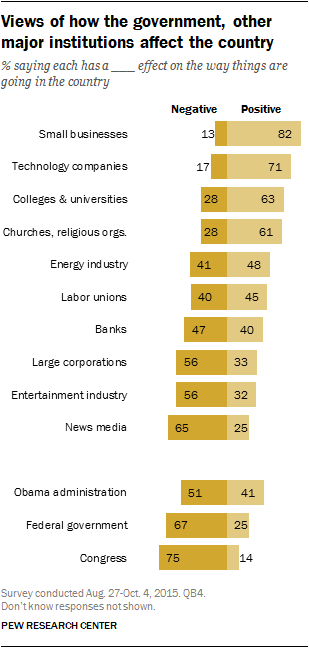
Of 10 nongovernmental institutions included in the survey, majorities say four are having a positive effect on the way things are going in the country: small businesses (82% positive), technology companies (71%), colleges and universities (63%) and churches and other religious institutions (61%).
The public is more divided over the impact of three other institutions – the energy industry (48% positive), labor unions (45%) and banks and financial institutions (40%).
And three others are viewed as having decidedly negative influence on the country. Just 33% say large corporations have a positive impact, 32% say that about the entertainment industry, and just 25% say the national news media has a positive effect. Majorities say all three have a negative effect on the way things are going in the U.S.
By comparison, 41% view the impact of the Obama administration positively and only a quarter (25%) say the federal government has a positive effect. Just 14% say Congress has a positive effect on the way things are going in the country, while 75% say its impact is negative.
In some cases, opinions about national institutions have become more positive since the previous study of attitudes toward government in March 2010, conducted when economic conditions were much worse than they are today.
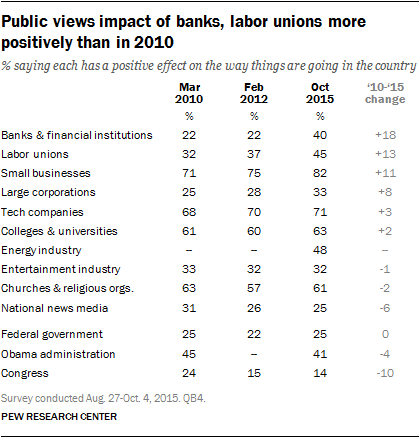
The share of Americans who say banks and financial institutions have a positive impact, which stood at 22% in 2010 (and 2012), has increased to 40%. The percentage saying labor unions have a positive effect on the country has risen 13 points (from 32% to 45%). And small businesses, whose impact was already viewed very positively in 2010, is viewed even more positively today (82% positive, up from 71%).
Opinions about the impact of other nongovernmental institutions have shown less change. There also has been no change in assessments of the federal government’s impact. Meanwhile, views of Congress’s effect on the country have become less positive: Just 14% say it has a positive effect on the country, which is little changed from 2012 (15%), but down 10 percentage points from 2010 (24%).
Partisan differences in views of impact of institutions
Democrats and Democratic leaners are far more likely than Republicans and Republican leaners to say labor unions have a positive impact on the country, and these differences have widened since 2010.
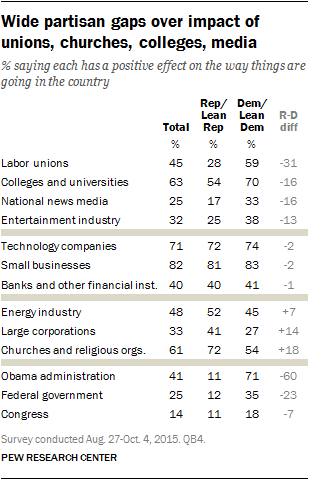
Currently, 59% of Democrats and just 28% of Republicans say unions have a positive impact. The share of Democrats who view unions’ impact in positive terms has increased 16 percentage points since 2010 (from 43%). Republicans’ views have shown less change (22% then, 28% now).
As in the past, higher percentages of Democrats (70%) than Republicans (54%) say colleges and universities have a positive impact. The partisan differences over the effect of the national news media and the entertainment industry are comparable – though majorities in both parties say these institutions have a negative effect on the country.
Republicans are more likely than Democrats to say that churches positively impact the country (72% vs. 54%). And while 41% of Republicans view the impact of large corporations positively, just 27% of Democrats agree.
Ideological divide over impact of churches, colleges
Among ideological groups, the impact of churches and religious organizations is viewed positively, except among liberal Democrats.
Just 41% of liberal Democrats say churches have a positive effect on the country; that compares with 64% of moderate and conservative Democrats, 69% of moderate and liberal Republicans and 75% of conservative Republicans.
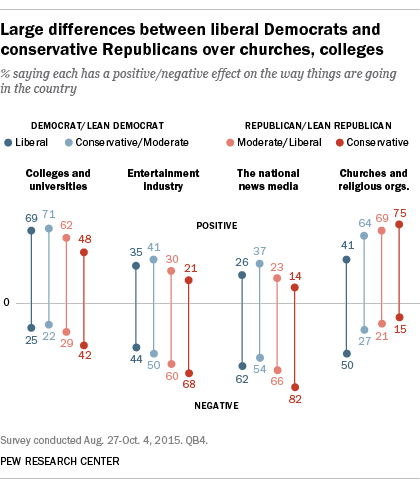
Conservative Republicans are more skeptical of the influence of colleges and universities. Only about half (48%) say they have a positive impact on the country; majorities in other ideological groups view their impact positively.
Majorities of adults, regardless of partisan and ideological affiliation, say the national news media is having a negative effect on how things are going in the country today. However, conservative Republicans and Republican leaners are particularly critical: 82% say the national news media has a negative impact, while just 14% say it has a positive impact.
Republicans are also more critical of the entertainment industry than are Democrats: Majorities of moderate and liberal Republicans and Republican leaners (60%) and their conservative counterparts (65%) say that the entertainment industry has a negative effect on the United States. Half of conservative and moderate Democrats and 44% of the party’s liberals view its impact negatively.
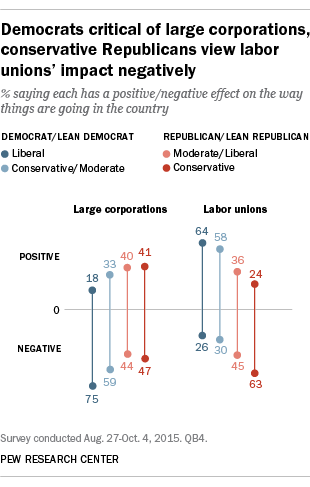
Majorities of both conservative and moderate Democrats (59%) and liberal Democrats (75%) say large corporations have a negative impact. Among Republicans, 47% of conservatives and 44% of moderates and liberals say they affect the country negatively.
Conservative Republicans are the only ideological group in which a majority (63%) says that labor unions have a negative effect on the country. Moderate and liberal Republicans express more mixed views (36% positive, 45% negative), while majorities of both Democratic groups say unions have a positive impact.
Democrats are ideologically divided over the impact of the energy industry, as well as of banks and other financial institutions.
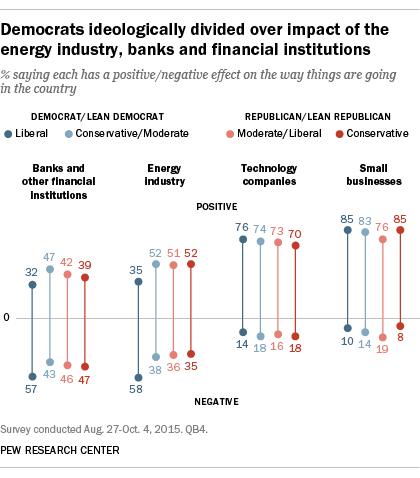
Liberal Democrats are much more likely than the party’s conservatives and moderates to view the effect of the energy industry negatively (58% vs. 38%).
And while 57% of liberal Democrats say banks have a negative effect on the country, a smaller share (43%) of conservative and moderate Democrats agree. Republicans express similar views of the impact of the energy industry and banks, regardless of ideology.
While there are partisan and ideological differences in views of the impact of most institutions, there is broad agreement that technology companies and small businesses have a positive effect on the way things are going in the country.
Feelings toward government and views of impact of institutions

People who say they are “basically content” with the federal government – 18% of the overall public – have a more positive view of nongovernmental institutions than do those who feel “frustrated” or “angry” with government.
Those who are content with government are mostly made up of Democrats and Democratic leaners. Nonetheless, the “content” group is positive toward nearly all institutions – even some, such as banks and financial organizations – that are viewed negatively by all Democrats.
In contrast, people who are angry at government (22% of the public) are more critical of some institutions than are those who express frustration or are content with government. For instance, just 41% of the “angry” group – who are largely Republicans and Republican leaners – say that colleges and universities have a positive impact; overall, Republicans (54%) view their impact positively.




